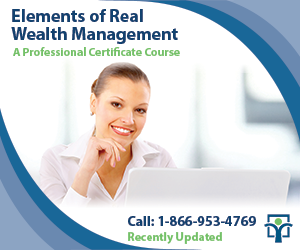Last updated: April 05 2016
A Five-Step Process for Managing Tax-Efficient Wealth

As government budgets close one tax advantage after another, it pays to do some tax planning now as you complete your 2015 tax return. Tax time is a great time to prepare a financial assessment through a sound interview process with your advisors. That’s because it’s a great opportunity to review financial affairs of the family as a whole.
Consider discussing with your advisors the five steps below, to develop a strategic process for planning a more tax-efficient wealth management approach to your financial decisions:
FIVE STEPS IN THE REAL WEALTH MANAGEMENT™ PROCESS
Step 1: A Thorough Interview: Discuss life events, financial events and economic events that will cause you to make decisions about your money in 2016 and 2017; don’t make your advisors guess. Volunteer the information about changes you are anticipating: births, moves, marriages, divorces, illnesses, severance, retirement, capital acquisitions or dispositions, for example.
Step 2: Do a Deep Dive: Prepare three financial documents to position your financial accountabilities properly: the tax return (and perhaps an estimation of 2016 taxes payable), the personal net worth statement and financial plans for your investment activities in the short and medium term.
Step 3: Do The Analysis: Will you need to pay more tax in 2016? Increase or decrease quarterly tax instalment payments? Should a new budget be prepared? Have you done some pre- and post-retirement income projections—after tax? Exactly how much capital should you be encroaching upon to maximize income to the top of your income tax brackets? Are you subject to any clawbacks in 2016?
Step 4: Invoke the Real Wealth Management™ Plan: What are the principles, rules and recommendations you will follow to close the gaps in the four key categories of your wealth plan—Accumulation, Growth, Preservation and Transition? What should you do first? How tax efficient are your plans? Will you be splitting income, transferring assets or managing your cash flow better to accumulate and grow more wealth?
Step 5: Joint Decision Making: Now execute your plan. A collaborative, inter-advisory approach following the same strategic wealth management plan means that all your family members and all the advisors on the team—accountants, investment advisors, legal advisors, business consultants—are on the same page with your financial goals and how to get there.
 |
Allow your professional advisors to complete, update and review three important financial documents at tax time:
- The PNW—Personal Net Worth statement
- The T1 Tax Returns in the tax compliance period
- The Financial Plans—for the near term (2016), medium term (5 years out to 2021) and long term (10 to 20 years out—2026 to 2046)
Together, these documents are consistent tools for your tax and financial advisors to use in implementing a Real Wealth Management™ strategy that can keep everyone accountable. This approach focuses on the accumulation, growth, preservation and transition of your wealth, while taking your purchasing power into account throughout the life of the plan (that is, after taxes, inflation and fees).
Your advisors will want to be client-centric in this collaborative process, which means they will need to ask specific and in-depth questions about the life events, financial and economic triggers that will affect your decisions about your money over the tax compliance period, which comprises the following timeframes:
- The current tax year
- Up to 10 years back to tax year 2006
- The next tax year, 2016
That’s why tax and financial planning make such good partners; they take into account your complete financial situation. Also be sure to include young people in your tax compliance activities this year so that you are taking a multigenerational approach to your wealth planning. Done well, The Real Wealth Management™ process is about planning for the best possible returns in the entire family’s lifecycle.
Evelyn Jacks is a best-selling Canadian author of 52 books including her latest, Family Tax Essentials. Evelyn is the Founder and President of Knowledge Bureau, a national educational institute. To learn more about professional tax preparation and tax-efficient wealth management, see www.knowledgebureau.com.





